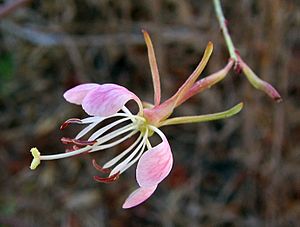Wavyleaf beeblossom facts for kids
Quick facts for kids Wavyleaf beeblossom |
|
|---|---|
 |
|
| Scientific classification | |
| Genus: |
Gaura
|
| Species: |
sinuata
|
| Synonyms | |
|
Oenothera sinuosa W.L. Wagner & Hoch |
|
Gaura sinuata is a pretty flowering plant. It is often called the wavyleaf beeblossom or Red River gaura. This plant belongs to the evening primrose family. In 2007, scientists changed its name. It is now part of the Oenothera genus. So, its scientific name became Oenothera sinuosa.
Contents
About the Wavyleaf Beeblossom
This plant is a tough perennial. This means it lives for more than two years. It grows in a mat shape. Its stems spread out and can be 20 to 60 centimeters (about 8 to 24 inches) long. These stems are covered in tiny hairs.
Where It Grows
The wavyleaf beeblossom is originally from Mexico. Its natural home also reaches north into the United States, as far as Oklahoma. You can now find it across the southern half of the United States. In these areas, it is an introduced species. Sometimes, it can grow a lot and become a bit like a weed.
What It Looks Like
The leaves of this plant are 1 to 10 centimeters (about 0.4 to 4 inches) long. They usually have small teeth along their edges.
Flowers and Fruit
The plant grows groups of small flowers. These groups are called inflorescences. The flowers have spoon-shaped petals. They start out white or light pink. As they get older, they turn a darker color, often a deep red. After the flowers, the plant makes a fruit. This fruit is a woody capsule. It has a winged shape and a pointed end. It can be up to 1.5 centimeters (about 0.6 inches) long.
How It Spreads
Scientists believe this plant might have formed from two different parent plants. It has a special feature called "self-incompatibility." This means a plant cannot make seeds by itself. It needs pollen from another Gaura sinuata plant. This helps to limit how much it can spread by seeds.

